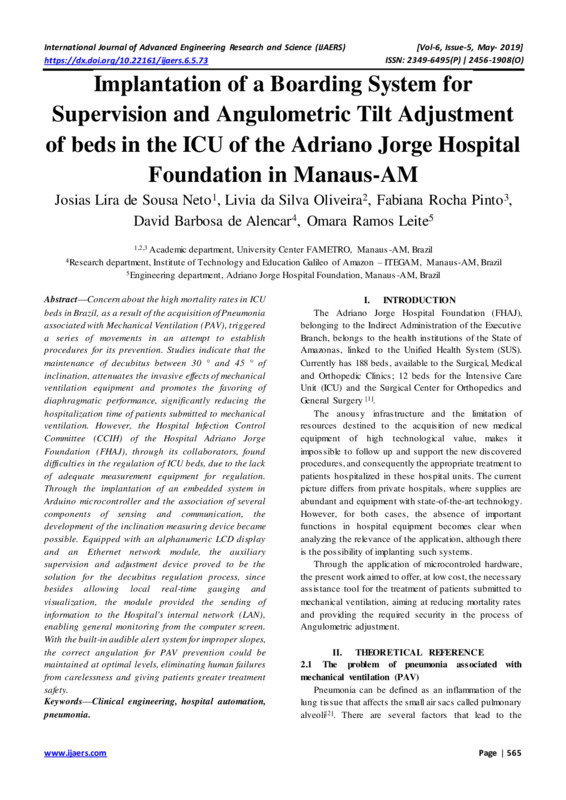-
Tipo do ITEM
-
Artigo Ciêntifico
-
Título do Artigo
-
Implantation of a Boarding System for Supervision and Angulometric Tilt Adjustment of beds in the ICU of the Adriano Jorge Hospital Foundation in Manaus-AM
-
Descrição
-
Abstract—Concern about the high mortality rates in ICU
beds in Brazil, as a result of the acquisition of Pneumonia
associated with Mechanical Ventilation (PAV), triggered
a series of movements in an attempt to establish
procedures for its prevention. Studies indicate that the
maintenance of decubitus between 30 ° and 45 ° of
inclination, attenuates the invasive effects of mechanical
ventilation equipment and promotes the favoring of
diaphragmatic performance, significantly reducing the
hospitalization time of patients submitted to mechanical
ventilation. However, the Hospital Infection Control
Committee (CCIH) of the Hospital Adriano Jorge
Foundation (FHAJ), through its collaborators, found
difficulties in the regulation of ICU beds, due to the lack
of adequate measurement equipment for regulation.
Through the implantation of an embedded system in
Arduino microcontroller and the association of several
components of sensing and communication, the
development of the inclination measuring device became
possible. Equipped with an alphanumeric LCD display
and an Ethernet network module, the auxiliary
supervision and adjustment device proved to be the
solution for the decubitus regulation process, since
besides allowing local real-time gauging and
visualization, the module provided the sending of
information to the Hospital's internal network (LAN),
enabling general monitoring from the computer screen.
With the built-in audible alert system for improper slopes,
the correct angulation for PAV prevention could be
maintained at optimal levels, eliminating human failures
from carelessness and giving patients greater treatment
safety.
Keywords—Clinical engineering, hospital automation,
pneumonia.
-
Abstract
-
Abstract—Concern about the high mortality rates in ICU
beds in Brazil, as a result of the acquisition of Pneumonia
associated with Mechanical Ventilation (PAV), triggered
a series of movements in an attempt to establish
procedures for its prevention. Studies indicate that the
maintenance of decubitus between 30 ° and 45 ° of
inclination, attenuates the invasive effects of mechanical
ventilation equipment and promotes the favoring of
diaphragmatic performance, significantly reducing the
hospitalization time of patients submitted to mechanical
ventilation. However, the Hospital Infection Control
Committee (CCIH) of the Hospital Adriano Jorge
Foundation (FHAJ), through its collaborators, found
difficulties in the regulation of ICU beds, due to the lack
of adequate measurement equipment for regulation.
Through the implantation of an embedded system in
Arduino microcontroller and the association of several
components of sensing and communication, the
development of the inclination measuring device became
possible. Equipped with an alphanumeric LCD display
and an Ethernet network module, the auxiliary
supervision and adjustment device proved to be the
solution for the decubitus regulation process, since
besides allowing local real-time gauging and
visualization, the module provided the sending of
information to the Hospital's internal network (LAN),
enabling general monitoring from the computer screen.
With the built-in audible alert system for improper slopes,
the correct angulation for PAV prevention could be
maintained at optimal levels, eliminating human failures
from carelessness and giving patients greater treatment
safety.
Keywords—Clinical engineering, hospital automation,
pneumonia.
-
Língua do arquivo
-
inglês
-
Data da Publicação
-
Ano 2019
-
Palavra-chave
-
Clinical engineering
-
hospital automation
-
pneumonia
-
Autores
-
Josias Lira de Sousa Neto
-
Livia da Silva Oliveira
-
Fabiana Rocha Pinto
-
David Barbosa de Alencar
-
Omara Ramos Leite
-
Local
-
ITEGAM - Manaus, 2019


